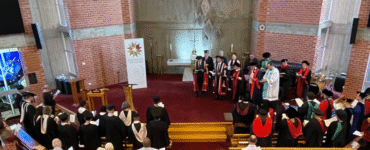Robyn Whitaker, Trinity College Theological School, writes in The Conversation that “at the heart of this [complementarian] theology is a problematic understanding of power, particularly God’s power.”
Conservative Christians need to stamp out clergy wife abuse – starting with ending endemic sexism
Robyn J. Whitaker, University of Divinity
On Wednesday night, viewers around the nation were likely shocked by the story of clergy wives’ abuse on the ABC’s 7.30. Survivors bravely spoke out about the rape and abuse they’ve suffered at the hands of their husbands who are priests. In some cases, these men have been aided by church hierarchy, who have hidden or overlooked their controlling and abusive behaviour.
Unfortunately, I was not shocked to hear these women’s stories. I’ve sat in groups at conservative Christian conferences where male-headship is taught, and where women discussed giving up their jobs when they married because God demanded nothing but full submission to serving their prospective husband’s careers, desires and ambitions.
I’ve heard conservative Christian speakers attempt to justify why the decision-making in a marital relationship should always be the man’s prerogative (God apparently designed it that way).
I’ve seen smart women be convinced that it is the only way to be a “real” Christian. I’ve seen insecure men selectively quote Bible verses to maintain their control and power. This theology can be powerful in the cult-like settings in which such teaching occurs. In these settings communities are closed, there is no room for diverse views, and questions are often dismissed as a sign of lack of faith.
The theology that lies behind such teaching is usually referred to as complementarianism. This is the idea that God designed humans in God’s image as two distinct and “complementary” sexes, each with a unique but essentially different role.
In its best possible form, those holding to this theological view argue that these gender roles are equally important. Yet in application, the gender roles are each aligned with a very different level of power: men are called to be leaders, teachers, priests and earners for their families; women are designed to nurture, raise children, and assist their husbands.
At the heart of this theology is a problematic understanding of power, particularly God’s power. If one imagines that God is absolute power and that the primary role of a Christian is to obey God, then that becomes the primary model for human relationships too.
When interviewed for this article, the Dean of the Berkeley Divinity School at Yale, Professor Andrew McGowan wrote:
One could argue that there is a broader problem in that whole strand of Calvinist theology and its emphasis on power. When God is seen as absolute power, the basic question of meaning and existence becomes that of hierarchy – whom do you honour or serve, and who serves and honours you? That sort of worldview not only lends itself to abuse, but it sanctifies power even when exercised benignly.
Other critics of complementarian theology include evangelical theologian Kevin Giles (see here and here), and Christian writer Rachel Held Evans.
This complementarian theology still holds sway in several parts of the church such as Sydney’s Moore Theological College, where it is taught as a legitimate, “biblical” theology. But it is not legitimate and it is not biblical. It is misogyny in theological wrapping, used to justify male control and the submission of women in their homes, their workplaces and in the church. It teaches men that their control extends even to women’s bodies, and women that their submission must be total.
As Julia Baird and Hayley Gleeson’s article pointed out, several of the women spoke about their church’s explicit teaching on submission, citing Ephesians 5:22-24 teaching, “wives submit to your husbands”.
The author of Ephesians is citing Greco-Roman household codes, which appear at several points in the New Testament. They reflect Roman patriarchal values of how different levels of society related to one another: slaves to masters, wives to husbands, and children to parents. It is only when we compare the biblical versions to other extant pagan versions of these household codes that we see the radical nature of Christian teaching.
Instead of just reiterating the ruling power of elite males, the biblical versions of these codes add elements of mutuality and respect. Men, too, must submit (to Christ) and they are commanded to love their wives. The Ephesians passage cited above begins with “be subjected to one another out of respect for Christ” (5:21). Such mutuality and consideration of a subordinate is nothing less than radical and egalitarian in the ancient world.
Complementarian theology is based on a literal reading of several other biblical verses as well. One of them is the second creation account in Genesis 2:20-24, where woman is made as a “helper” for Adam.
The Hebrew term often translated helper or helpmate (ezer) does not denote a subordinate or submissive position. After all, it is used numerous times in the Bible to describe God. So why assume when applied to a female it suddenly indicates subordination? In that mythical tale, Eve is compared with the animals as the only helpmate suitable or like Adam. The point is that she is his equal and counterpart unlike other animals. To read it as prescribing gender hierarchy is missing the entire point of the story.
While it is important to name individuals and even theological colleges that are perpetrators of the problem, pointing out isolated cases will not address the fundamental underlying issues that rely on deeply problematic readings of the Bible and ideas about God.
Readers should note that complementarianism is a minority strand of fundamentalist theology, one not supported nor taught by the majority of Christian communities around the world because of the problematic way it imagines human-divine and human-human relationships and the literalistic way it uses the Bible.
![]() It is time for fundamentalist Christians to examine their own theology and face up to how it has contributed to the abuse of women, intentionally or otherwise.
It is time for fundamentalist Christians to examine their own theology and face up to how it has contributed to the abuse of women, intentionally or otherwise.
Robyn J. Whitaker, Bromby Lecturer in Biblical Studies, Trinity College, University of Divinity
This article was originally published on The Conversation. Read the original article.






Add comment